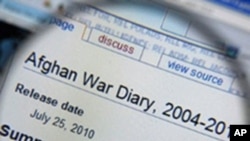A special team at the Pentagon is preparing to take action to protect American units and Iraqi citizens who officials say might be put in danger by the expected release of secret documents by the activist website WikiLeaks.
The 120-member task force has been working in secret for months, reviewing a database of 400,000 Iraq War documents - believed to be the same documents WikiLeaks has. A Pentagon spokesman, Marine Corps Colonel David Lapan, says the team has found information that would put people and military operations in danger.
"They found names of individuals," said Colonel Lapan. "The found, again, things that could give our enemies information about our capabilities and our operations that would be damaging. So they are prepared, once documents start to appear, to take action based on those documents."
Colonel Lapan indicated that individual Iraqis will be notified if their names appear in the documents, and some military tactics might need to be changed.
These documents are field reports of what are called "significant activities." They are believed to cover the period from late 2003 to the middle of this year. Colonel Lapan says that is a timeframe that has been "very well chronicled," so he does not expect major revelations about the conduct of the war.
"These are raw observations from the tactical level of combat operations," he said. "They could be casualty incidents. They could be IED [Improvised Explosive Device] incidents. They could be information on working with, in this case, Iraqis, any number of things that units use this database to report."
The colonel says some of the reports are just a few lines long.
The Pentagon has called on WikiLeaks to return all the secret material it has obtained, but the organization has refused. Its officials say there is value in releasing the raw information. But the Pentagon calls the wholesale release of the secret documents "irresponsible."
In a statement emailed to reporters Friday, Pentagon Press Secretary Geoff Morrell called the documents "snapshots of events" that "do not tell the whole story." He said U.S. "enemies will mine this information looking for insights into how we operate, cultivate sources and react in combat situations…" Morrell says the publication of the material "could very well get our troops and those they are fighting with killed."
WikiLeaks published more than 70,000 similar documents from the Afghanistan War in March, and Pentagon officials issued similar dire warnings. They acknowledge they can not point to any incident in which people died or operations were compromised by that release, but they say such consequences could still happen.
And Colonel Lapan also acknowledges that some other concerns about the initial release were not borne out, including fear the documents could contain the names of intelligence sources.
"The database in the case of Afghanistan, and also now in the case of the Iraq database, wouldn't contain intelligence sources and methods in it," he said. "The sources, again, that we talked about, are more people cooperating with our forces. But in terms of intelligence sources, that's a different level."
Pentagon officials think they know what documents WikiLeaks has, and are ready to deal with their release. But members of the special task force will be checking the website closely to see if there is any secret material made public that they were not expecting.




